Context Matters.
Words matter, of course. But they only tell part of the story.Words, by themselves, can easily be misunderstood. The same words in different CONTEXTS (settings or situations) can mean very different things. Think about texting and emailing. Have you ever misunderstood what someone was saying because you did not understand the context? For instance, you may have been asked to do something later. But what does later actually mean? For some, it may mean a few minutes. For others, it may mean much later, like a week or month, or even never. How do you know? CONTEXT!
Contextual details tell the audience (or you)
- What is important and deserves attention
- How to interpret words and non-verbal signals
- Which assumptions can reasonably be made
- The meaning of what is being communicated
You’ll use contextual details when learning and working with topics in college, both in your communication to others and your interpretation of what others share. Contextual information is critical in readings.
- In college-level learning, you may need to seek out the details you need. An example of this is that you might have a dataset and need to look at other records to understand what was happening in the world when the data was collected. This extra information, the contextual details, enables you to understand the data more thoroughly.
- In textbooks, the context will be clear; textbook authors include contextual details to ensure you know what they are discussing.
- In other forms of writing, you will need to work to find information and add context, especially in unfamiliar areas of study. Authentic writings, like scholarly materials, tend not to include background details for you.
Beyond the classroom, context shapes how you interact with others and your environment and affects how you understand the world around you, your interactions, and your understanding of others and your environment.
Without realizing it, you pay attention to your environment (the setting) and your situation (what is happening around you). This constant analysis of context is essential- it keeps you safe and allows you to understand what is happening. In the physical world, we draw contextual information from what we see, hear, and feel. What you have experienced in the past also provides context to your current experience as it affects how you perceive others, objects, expressions, and emotions.
Beyond knowing your college, you also should spend time thinking about your future self, the person you want to become. Knowing who you were before college and who you want to be at the end of your college experience will help you identify your “WHY”, the reason that you are here. And knowing where you are (context) and why you are here (your “why”) will set you up for success.
-Dr. L
You add & interpret context in communication by determining:
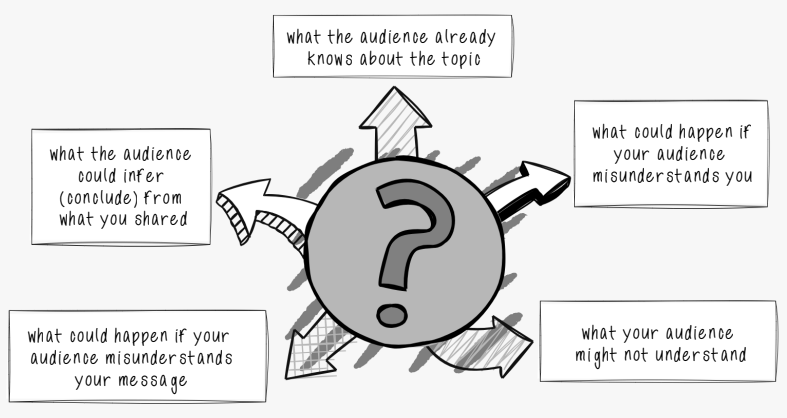
Knowing your college context tells you:
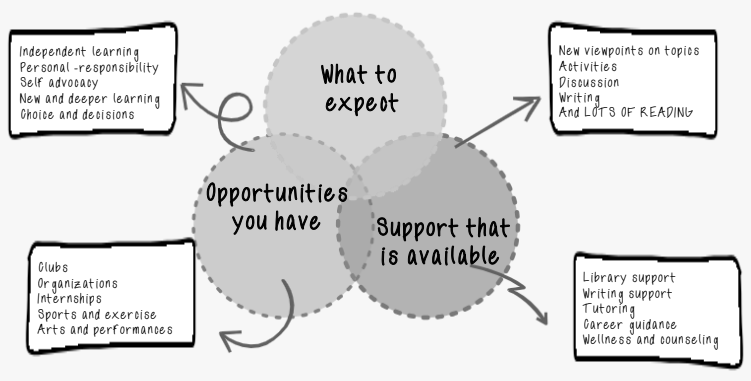
Attention to context is necessary—it matters for your personal life and relationships, safety, and studies. Using contextual information will help you understand the material in your classes and communicate your ideas in ways that will ensure your audience receives your message clearly. It also lets you understand where you are and what you can gain from your college environment.
What is your origin story?
By the time you start college, you have had a lifetime of experience and learning behind you. You started learning at birth and have learned in informal and formal education. But who are you? College Is a time for learning new things, testing your limits to know what you are capable of (hint: it’s more than you think), and trying on new identities. You don’t become someone different just by walking into college. You bring your past self with you, and your experiences and learning provide context for your life in college and beyond.
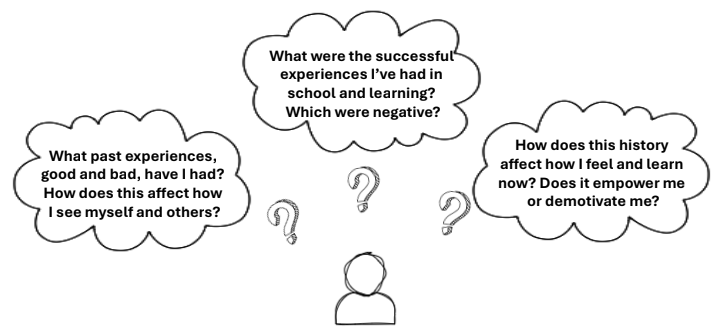
Your origin story starts from your earliest days and includes formal learning plus all you’ve learned and experienced with family, friends, and others.
Your origin story includes your family and the context you were raised in, but it does not dictate your future. It helps you understand who you are and how you got here.
What do you know about your college?
How did you choose what college to attend? There is no one way to pick a college. and no right path to college. In fact, the United States had 3,931 degree-granting colleges and universities (as of the 2020-21 academic year, according to the NCES). There are a lot of colleges and universities to choose from!
Some people choose their college based on its location, and others choose based on the programs that a college or university offers. I’ve met with students who choose based on the reputation of their college or the people who attend. And, of course, finances are a part of this, too.
 Did you know that the vast majority (85%) of college students in the US attend local colleges and universities and do not live on campus? Did you know that the vast majority (85%) of college students in the US attend local colleges and universities and do not live on campus?
Though television and the news may make it seem like everyone lives in a dorm, most students commute to college. |
You can learn a lot about your college on its website. There are many things to look at, including:
- Institutional research, including demographics and statistics about the college
- Campus life and student activities, such as clubs, organizations, and social opportunities
- Student support services such as tutoring, counseling, health, and wellness
- Campus security or police that publishes reports on campus safety and issues
Do most or all of your college’s students live on campus or off campus? What clubs and organizations are active on your campus? What is the area around your college like and what does it offer?
What is higher education, and what are colleges and universities?
Colleges and universities are higher education institutions. Both can grant degrees, but there are some common differences. A college is usually a smaller institution with a more limited number of programs of study. A university is typically a larger institution made up of colleges and will offer more programs and several higher (master’s or doctoral) degrees.
Education in the US: elementary → secondary/high school → higher education
Colleges and universities can be public, non-profit private institutions, or for-profit private institutions. In addition, colleges can have focus areas and be designed with an emphasis on the liberal arts.
2-year, community, or junior colleges
grant associate degrees, provide vocational training, certificates, and workforce development and:
- offer both degree and vocational/trade programs
- are less expensive than 4-year institutions
- offer flexibility in completing a degree
- are set up for adults who have complex lives
- provide a pathway to a 4-year degree through transferring to other colleges
Many students start here and transfer to 4-year colleges after completing an associate degree or when they are ready.
4-year colleges and universities
grant baccalaureate or bachelor’s degrees and may offer master’s or doctoral degrees and:
- can be commuter (students live off campus) or residential (students live on campus)
- schedule with the expectation that students are full-time students
- have specific course and involvement requirements
- have more resources on campus related to programs and the community
This is what most people think of when they think of college or university.
The type of college or university you attend makes a difference in what types of courses you can take and the degrees you can earn.
What is the purpose of college, and why does that matter?
If you ask 10 people to share the purpose of college, you’ll hear 10 different answers, probably including one from someone who says that college is unnecessary. Many people do fine in life without a college degree. Still, you are better off completing a degree than not. A degree doesn’t guarantee success or a certain lifestyle, but it can increase the amount of money you make in your lifetime, and most people are better off with a degree than without one.
A degree is powerful because it gives you more CHOICE over what you do, who you work for, and where you live. This includes:
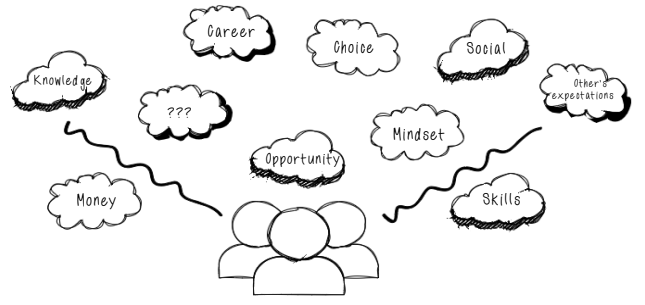
| People come to college for many reasons. Some because they know what they want for their life and need the knowledge and skills that college learning provides. Others come to college because family, teachers, and friends push them to do so. Many come to college because they don’t know what else to do or because it seems expected. In addition, some come to college later in life when they are ready to take advantage of what college learning can do for them. -Dr. L |
The college debate: Two competing purposes
| To create leaders and educated citizens | To provide a return on investment |
| College originally was designed to develop leaders and educated citizens. In the beginning, college was for the elite and over time, evolved to prepare people with a solid liberal arts foundation and specialized skills they could use to contribute to society. | As college became more expensive (this started in the 1990s and increased tremendously in the 2000s), college took on a significant role in career preparation. Students and their families wanted to see how the cost of college would provide a living, not just knowledge. |
These two purposes do not fit well together, and, at different times in history, each has determined how funding, rules, and expectations have been decided.
| My personal view:
College needs to provide you with the foundational skills you need to be a leader, problem-solver, AND professional who can support yourself and your community. This is how I reconcile the 2 big goals; by focusing on how college can help us make our world a better place for ourselves and others. – Dr. L For you, know that your PERSONAL goals matter. The reasons YOU came to college matter. You will hear debates on the value of a college education and what college should do. Only you can decide why college is important to you. |
What your degree is made of: General education core, majors, minors, disciplines (& electives)
When you think of college, you likely think of your major. A major is a course of study: a set of classes that gives you specialized knowledge and skills in a specific area. Majors are created within disciplines. A discipline is a field of study- and a major can combine courses from different disciplines. You can also choose to complete a minor course of study, which allows you to add another area to your knowledge and skills.
| One student I know chose to major in cellular biology and minor in general psychology. They built knowledge and skills in both areas. Another student chose a major in computer science with a minor in sociology because they wanted to understand how data is collected and managed with technology and be able to interpret and use that data. These combinations interested the students and gave them a unique way of looking at the world. – Dr. L |
In addition to your major (and possible minor), you will also complete general education core courses. Like your major, this is a course of study. General education focuses on critical skills and knowledge related to foundational areas like communication and understanding the world and society. Your general education core course of study likely includes writing, speech/communications, history, science, and arts, humanities, science, and social science courses.
You’ll possibly have the chance to take electives, which are classes that interest you but are not required, so watch for those, too!
| The path ignored: I once met a very high-level executive. He told me that he only took business classes as a student because that was all he needed. Now, he wished he’d taken art history. He often felt out of place when working with people with broader backgrounds than his, and he could not appreciate or understand the art that he saw in museums, corporate buildings, or homes. One important point he made was that not only did he not have the ability to appreciate and analyze art, but he also missed the opportunity to learn to build these skills. In his life, he feels at a disadvantage because he does not have the same way of seeing things as others he worked with. – Dr. L |
A degree is more than studying one topic- it is meant to provide an education that helps you learn to learn in the future, build foundational skills for all areas of your life, and develop a specialized way of seeing the world around you.
A degree consists of:
| General education core courses | Major course of study | Electives (maybe) |
|
|
|
A course of study is a list of classes that you take to ensure you have the knowledge and skills you need in that specific area.
The skills and knowledge from general education core courses directly relate to what employers are looking for! Employers are looking for communication, teamwork, leadership, problem-solving, conflict management, and critical thinking.
Your major (and minor) affects what you learn and how you learn it. They also inform how you will do your work in the future but do not decide what you will do (most people have flexibility and a choice of how they use their learning, regardless of major).
Who are my faculty?
A college’s faculty are the individuals charged with managing learning at the institution. They are expected to provide instruction in specific knowledge and skill areas that college committees set. The faculty assesses your knowledge and skills and determines if you meet the requirements to complete a course. Your faculty are experts in their field and were chosen because of what they know. You should expect them to be experts, but not expert teachers. This is important as the expectation in college is that you know how to learn and take responsibility for your learning during and between classes.
How are college faculty different from high school teachers?
In high school, teachers are heavily involved in day-to-day learning. They are trained and expected to monitor student learning and work with students to achieve the learning goals for the classes they teach. Elementary, middle, and high school teachers have a teaching degree and background in a specific subject. They are trained to manage learning and set up assignments, lessons, and learning environments for their students.
Your college faculty have advanced degrees and experience in their field. Faculty typically have at least a master’s degree to teach, and many (especially tenured or tenure-track faculty) have a doctoral degree plus work and research experience. While many college faculty care greatly about teaching and learning, few have a formal background in how to structure learning or in how people learn. They are not teachers—they are subject matter experts who teach classes.
Your college faculty expects you to be more independent and ask for help when needed. They are not responsible for your learning. They are responsible for providing information that supports your learning. This is different from high school, where your teachers are trained and expected to monitor your learning.
As an adult, you are responsible for making sure you have the materials you need, do the work as assigned, and meet with faculty during office hours and tutoring or support services when you need them.
There are different types of faculty- you may not know their employment type, but you should be aware that not all faculty have equal roles on campus.
Contingent (temporary) faculty are most likely to teach classes in US higher education.
According to research published by the AAUP in 2023, nearly 70% of faculty in the US are contingent (not permanent) faculty. Contingent faculty may have the same qualifications as tenured or tenure-track faculty but typically can’t earn tenure. They are unlikely to have the same support or opportunities for research and career growth as tenured or tenure-track faculty.
- Work on short-term contracts
- May be part time (1-3 classes) or full time (4-5 classes plus other responsibilities)
- Part time (adjunct faculty) typically have other jobs
The typical image of a professor is one with tenure, a lifetime appointment, fewer classes to teach, and support for research.
Some faculty, mainly at research intensive institutions, may focus heavily on research and teach a smaller number of classes during the year. There may be specific teaching focused faculty who may provide service to campus, like supervising clubs, committee work, and student support.
- May have tenure (part of permanent faculty) or be tenure-track (working towards tenure)
- Focus on proving their ability to research and publish
- May lead initiatives to support the surrounding community
Most people think of tenured and tenure-track faculty when they think of faculty, with job protection and research.
 Remember:
Remember:
Almost all teaching faculty have OFFICE HOURS, periods of time devoted to supporting students.
Meet with your faculty during these hours to get to know them, learn more about the discipline and topics you are studying, and seek support!
Programs, support, and administration: what are they?
There are many different areas of a college or university beyond the instructor and classroom. The term program can refer to an academic or non-academic program with a set of related activities with a specific goal. Many services (and programs) are part of both academic (instruction and research) and non-academic departments. Administration refers to the management level of the college or university, who you may never talk to or meet but make up a great deal of the full-time staff on campus AND make decisions that affect you and your faculty.
While it’s common to think of college as classes and degrees, there are many departments and functions that enable you to be a student. You will likely need to interact with some of these during your college years.
Places and departments on campus you should know
| Tutoring: support for academic work, including writing |
| Registrar: manages class details and grades |
| Advising: provides support on course selection and majors/minors |
| Financial Aid: assists students in dealing with loans and grants |
| Bursar or Student Accounting: maintains student financial records |
| Career Services: provides career counseling, assists with internships, resumes, and interview preparation |
| Student Affairs: also known as student life, services, or a similar name assists students in taking full advantage of what the college offers and supervises events and organizations |
*Different colleges use different names for these areas. Chances are, you’ll need to work with these departments!
Dive into knowing your college: Can you know how to find these on your campus?
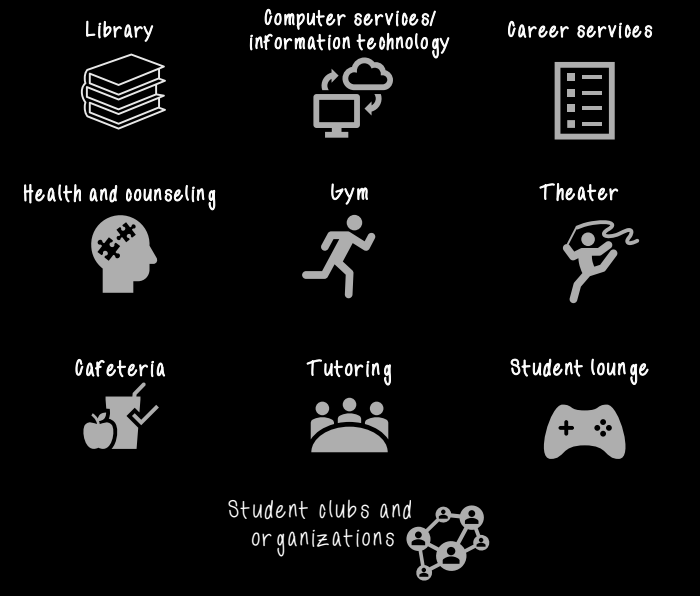 **Remember, these can be physical, virtual, or even both!
**Remember, these can be physical, virtual, or even both!